When it comes to investing in assurance vie for inheritance planning, the focus is often on the very generous inheritance benefits applied to policies where sums are invested before the age of 70. I am often asked by clients ‘is it worthwhile investing in assurance vie after the age of 70?’ The answer is ‘most definitely YES!’
Assurance Vie & inheritance planning
By Sue Regan
This article is published on: 9th August 2024
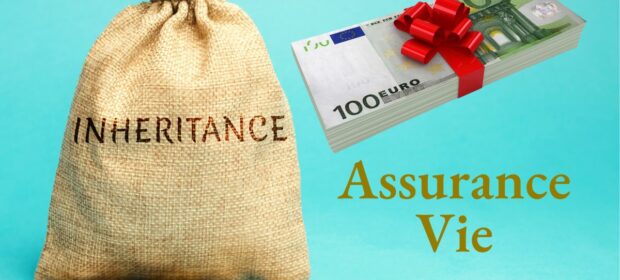
As a change from the norm, this article focuses mainly on the inheritance benefits of assurance vie investment beyond the age of 70.
As already stated, it is often a misconception that investing in assurance vie for inheritance planning is only attractive for people under age 70. Undoubtedly, investing before age 70 has very attractive inheritance benefits, but there are also valuable inheritance planning opportunities for sums invested after age 70 which should not be overlooked.
As a reminder, an assurance vie policy is “outside the estate”, according to Article L132-12 of the Insurance Code. This means that in the event of the death of the insured, the capital does not go to the heirs within the meaning of the Civil Code but to the named beneficiary(ies) of the assurance vie policy.
Sums invested into assurance vie beyond the age of 70 have an inheritance allowance of €30,500 and a exemption from gains on the total sum(s) invested. The choice of beneficiary is completely unrestricted and the allowance (and profit) is shared by all beneficiaries in the proportion to which they have been nominated. If you have existing policies that were funded before age 70 the €30,500 allowance is in addition to the €152,500 per beneficiary granted with pre-age 70 premiums.
It’s probably worth highlighting here that a notable difference between the pre-age 70 allowance and the post-age 70 allowance is that the €152,500 allowance includes both the premiums paid on the policy and the gains on these premiums, whereas the €30,500 allowance relates to the amount of capital invested and all gains across the whole policy are exempt from IHT.
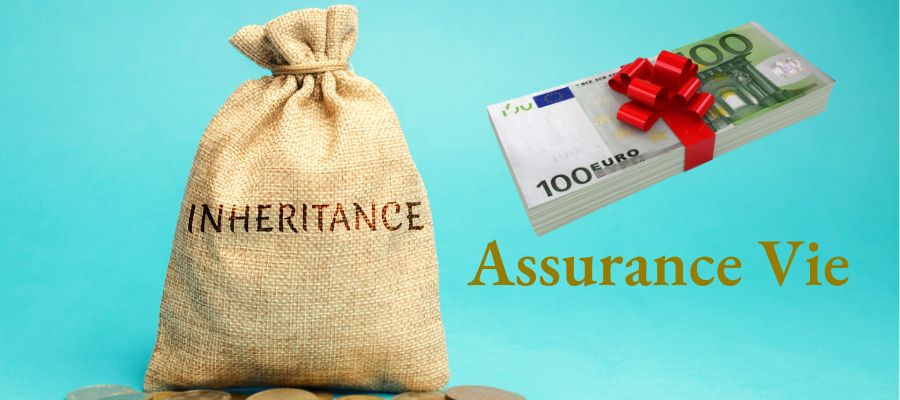
It is perfectly possible to add sums to an existing policy after the age of 70 and the insurance company will calculate the benefit payable on death of the life assured in accordance with when premiums were invested. However, taking out a new policy after the age of 70 has the advantage of:
- Differentiating between sums paid before and after age 70 and therefore simplifying the tax calculation
- Provides an opportunity to nominate beneficiaries that are different from those nominated in other policies
- Designate different policies for different purposes
It is worth noting that there is no limit to the number of assurance vie policies that can be taken out but the IHT allowances apply across all policies of a particular life assured (i.e. the allowances are not per policy).
Let’s take the example of a couple who are living together but have no ‘legal’ relationship (i.e. not married or PACS’d):
– A 70-year-old makes a will in favour of his/her partner. Under standard French inheritance rules the surviving partner is entitled to an IHT allowance of just €1,564 on any assets received via the will, and above that will have to pay IHT at the rate of 60%.
– If the deceased had nominated his/her partner as the sole beneficiary of an assurance vie policy opened after the age of 70, the surviving partner would then benefit from an IHT allowance of up to €30,500 and an exemption from IHT on all the gains and interest on the policy.
Exceptions as to who shares the €30,500 tax-free allowance
Beneficiaries who are exempt from inheritance tax are not taken into account to divide the overall allowance of €30,500. Exempt beneficiaries include spouses and PACS’d partners.
Thus, if the spouse of the deceased is named as one of the beneficiaries of the policy, his/her share will not be taken into account when dividing up the €30,500 allowance, which will only be divided amongst any other named beneficiaries, meaning their exempt share will increase.
If, after applying the exempt allowances, there remains a taxable element of capital invested, this can be offset against the standard inheritance allowances determined by the degree of kinship.

The potential growth in value of an assurance vie policy makes investing after age 70 attractive
Let’s look at a couple of examples:
Example 1
A premium of €30,500 is invested at the age of 70, the insured person dies at the age of 87.
For 17 years, the policy grows at an average rate of 2% per year, net of fees. At the end of 17 years the gain in value is €12,339, thus a total of €42,839 is passed tax-free to the beneficiaries. At 3% per year, the amount of gain after 17 years represents €20,259 meaning a total of €50,759 passes free of IHT. If the €30,500 had been left on deposit with interest added at a similar rate the capital and interest would fall into the estate and be subject to the standard IHT rules.
Example 2
A premium of €100,000 is invested at age 70 and the life assured dies at the age of 90, i.e. 20 years later. The beneficiaries are the life assured’s two children in equal shares.
Taking an average growth rate of 4% per year, the €100,000 becomes €222,258 after 20 years. Each child receives €111,129. This is in addition to anything they may receive from a pre-age 70 policy. €30,500 of the capital and all gains are exempt, therefore the only taxable element for each child is €34,750 (€69,500 / 2). This can be offset against the standard IHT allowance of €100,000 per parent per child if this is not used up elsewhere.
Example 3
A nephew receives €55,000 from an assurance vie policy taken out by his uncle when he was over 70 years old.
The premiums paid amounted to €40,000, the gain was €15,000. €30,500 of the premiums paid and the gain of €15,000 are exempt.
Therefore, the potentially taxable element is €9,500 (€40,000 – €30,500). However, this can be offset against the inheritance allowance between uncle and nephew of €7,967. Assuming the allowance is fully available the taxable element is €1,033 (i.e. €9,000 – €7,967) at the rate of 55%. IHT of €568 is payable (i.e. €1,033 X 55%).
The outcome, €55,000 was transferred via an assurance vie opened after the age of 70 to a nephew who pays only €568 in IHT instead of €25,868 if the legacy had not been wrapped in assurance vie (i.e. €55,000 – €7,967 = €47,033 x 55%).
In summary, if your situation allows, it is definitely worthwhile considering investing in assurance vie after the age of 70 in order to take advantage of the additional €30,500 allowance and exemption on the total gains on investment which, in some cases, could be higher than the capital invested. Not forgetting, of course, that you retain control of the policy and can spend it or change the beneficiaries whenever you wish.
If you would welcome a chat about whether investing in assurance vie is right for you or would simply like a review of your financial situation you can contact me at sue.regan@spectrum-ifa.com or call me on +33 6 89 20 32 47
Finance in France – what’s new in 2023?
By Sue Regan
This article is published on: 12th January 2023

Firstly, I would like to wish you all a very happy, healthy and peaceful 2023!
As we are starting a new (tax) year I thought it would be helpful to update you on some changes that may affect you in 2023, both tax related and more generally.
Unsurprisingly, the main purpose of ‘la Loi de Finance’ (Finance Act) for 2023, published on 31st December 2022, is to help protect households and businesses from inflation.
Personal Tax Changes in 2023 for revenue received in 2022
In order to contain the effects of inflation on the level of household taxation, the Finance Act for 2023 has increased the tax brackets of the progressive ‘barème’ scale, applicable to income received in 2022, by 5.4%. That’s almost four times higher than last year. There are no changes to the rates of tax.
Increase in income tax brackets
The progressive barème scale for income received in 2022 is as follows:
| Income threshold for single person household | Tax rates |
| Up to 10,777 € | 0% |
| From 10,078€ to 27,478 € | 11% |
| From 27,479 € to 78,570 € | 30% |
| From 78,571 € to 168,994 € | 41% |
| over 168,994 € | 45% |
As France pools allowances for households of more than one person, the threshold for tax-free income received in 2022 by a household of two will be in the region of 29,000€.
Social charges
There have been no changes made to the rates of social charges for 2023 and they remain as follows:
| Employment income | 9.7% |
| Pension income | 9.1% |
| Investment income | 17.2% |
The special lower rates also remain in place as follows:
Pensions
The rate of social charges on pension income is reduced to 7.4% for those households where taxable income is less than around 2,000€ per month (or 3,000€ per month for a couple). Holders of the EU S1 certificate, and those who are not affiliated to the French health care system, are exempt from social charges on pension income, regardless of the amount received.
Investment income
As above, for holders of the EU S1 certificate, and/or those covered under the health care system of another EU/EEA country, social charges are reduced from 17.2% to 7.5% for investment and property income.
Taxe d’Habitation
Good news for homeowners and renters living in France! The phasing out of taxe d’habitation which began a few years ago will come to an end in 2023, with this property related tax being scrapped for all principal homes in France. This also includes the abolition of the TV licence (contribution a l’audiovisuel public).
However, second-home owners and owners of vacant properties are still liable to pay taxe d’habitation on these properties.
Wealth tax on real estate – Impôt sur la Fortune Immobilière (IFI)
The current threshold of 1,300,000€ will remain in place for 2023 with no changes to the scale rates of wealth tax.
Assurance Vie
There are no changes to the taxation of assurance vie policies or their inheritance planning benefits. Thus, these popular investment ‘wrappers’ remain a very attractive vehicle for both personal taxation and inheritance planning.

So, what else is there to know…………
Energy prices are going up
With inflation in France at its highest in decades and global energy prices having sky-rocketed in 2022, 2023 is set to start with a series of price hikes. Firstly, the 4% cap on energy tariffs went up on 1st January, meaning a potential increase of up 15% on gas and electricity bills. In practice, this means that average household bills are likely to go up by around 20€ a month.
Petrol subsidies come to an end
Petrol prices increase from January, with the government’s fuel rebate ending on December 31st. However, a fuel grant of 100€ is available for low-income workers who rely on their car for work. Full details can be found in this link to the government website Indemnité carburant de 100 € : comment ça marche ? | impots.gouv.fr
Increase in the minimum wage
France’s minimum wage (or SMIC) has gone up 1.8%, putting the gross monthly wage at 1,709.28€ or 1,353€ net. Importantly, this figure is used as the basis for calculating the sufficient funds needed for a French visa, so we can expect the required minimum income to go up accordingly.
Increase in motorway tolls
French motorway tolls are set to go up from 1st February with an average 4.75% increase.
Expected increase to savings interest rates
The interest rate on the popular tax-free savings accounts, the Livret A and the Livret de Développement et Solidaire (LDDS), is re-assessed every six months and it is expected that the rate will be increased to at least 3% per annum on both accounts with effect from 1st February.
France is going paperless
You will have probably already noticed that some stores are asking if you want a receipt or not, and more and more shops are offering the option for an emailed receipt. From April, this more eco-friendly practice will become standard practice at all shops. Thus, if you still require a printed receipt, you will have to specifically ask for one.
Cold call relief
Some better news if, like me, you are constantly being harrassed by cold callers – new regulations from next March mean that commercial phone calls can no longer be made on weekends, evenings after 20h00, or lunchtime from 13h00 to 14h00.
Review your finances
The last few years have been somewhat different to say the least. A global pandemic swiftly followed by war in Europe, both of which we haven’t experienced for generations. These highly unusual events have proved very challenging for many including governments, health workers and investors. The start of a new year is always a good time to review your finances. I am here to help and I would be very happy to sit down with you for a review to ensure that your financial plan is on track to achieve your longer term objectives. Please contact me at sue.regan@spectrum-ifa.com or call me on 06 89 20 32 47.
Have you prepared ‘THE’ Folder?
By Sue Regan
This article is published on: 9th January 2023
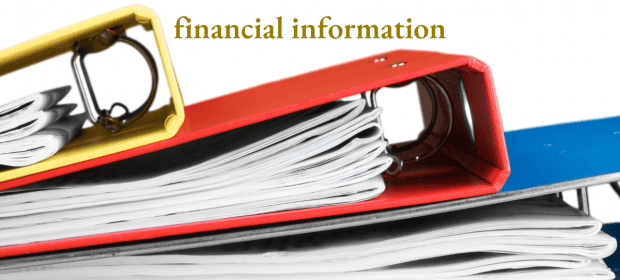
I like to read articles written by my Spectrum colleagues, especially those working in France, but also those by colleagues working in other European countries as I find it interesting to read what the hot topics are in their areas and how they compare to France. I came across a very interesting one recently entitled ‘THE Folder’, written by my colleague, Gareth Horsfall, who lives and works in Italy.
The article is of universal interest and although the subject matter could be viewed as having rather depressing undertones, it includes some really useful tips on keeping our affairs in good order, not only for ourselves but, more importantly, to help those close to us who may be tasked with taking over at a time when we may not be around to/or capable of doing it ourselves. Under ‘normal’ circumstances this would be a stressful and difficult time for family but potentially far more difficult for anyone trying to deal with the affairs of someone who lives/lived in a different county, with little or no knowledge of that country’s legal or financial system and unable to speak the language.
I like to think of myself as being fairly well organised when it comes to keeping my ‘filing’ in order. I say ‘my filing’ because my husband sees finance and admin as my department (not surprising given my occupation) and he is more than happy to leave everything to me. Like many of you, I am sure, I have a drawer with lots of itemised dividers separating out all our important documents, statements, bills, birth & marriage certificates, etc so that I can lay my hands on everything very quickly, and I have a spreadsheet of our various bank accounts, investments and pension arrangements, etc so that I can keep track of everything.
For a while now, I have been mindful of the need to provide relatives with details of our affairs, especially as we live in France, which only further complicates matters for them if left to take over. However, on reading Gareth’s article, I realised that there is so much more I should do to make things as easy as possible for them if the unthinkable were to happen. So, I have made a start on putting together ‘Our Folder’ based on the very comprehensive list in Gareth’s article, which I have used below to share with you in the hope that it will be a useful guide for those of you who may need it.
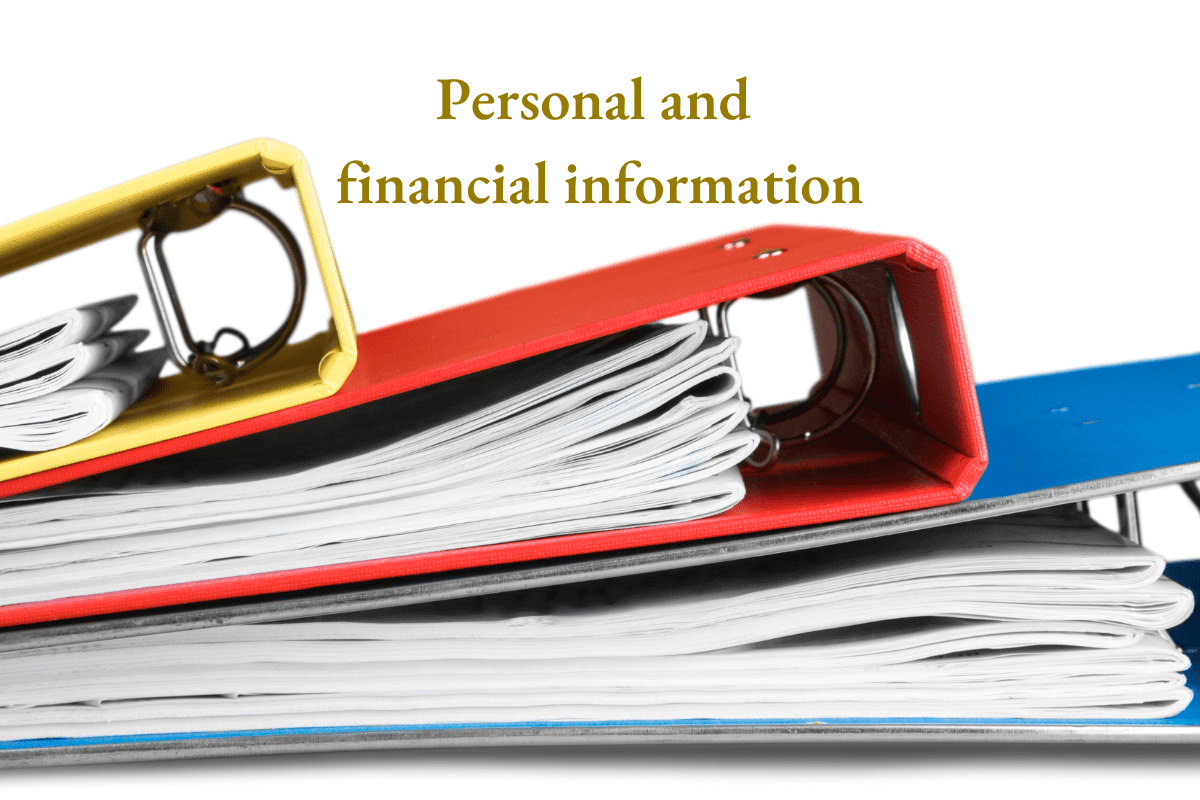
So what is ‘THE’ folder?
It is a single file (digital or physical – preferably both) where you keep all of your important personal and financial information together. It allows easy access to these documents in the event that you’re no longer around to help. It is really important to have it in place especially where one family member takes the lead with the family finances.
It seems like a lot of work – is it worth the effort?
Yes, absolutely! A time of loss can be stressful enough without having to try and piece together the deceased’s financial affairs. Don’t underestimate the benefit this will provide to the executors of your estate if you have one place with all your financial and legal documents in an easy to understand format. I know from experience it will be very much appreciated – my dear Dad was a stickler for record keeping and had put together his version of his and Mum’s ‘Folder’ which made it much easier for my Mum, my sisters and I to sort things out after he passed.
However, preparing ‘THE’ folder is more than avoiding stress – if you leave behind an administrative nightmare you could delay the accessing of funds by inheritors and the potential for racking up sizeable legal fees.
So which is best…..physical or digital?
This comes down to personal preference, but I would recommend both, if possible. Whether you choose to have a digital folder with all these documents in or not, you should at the very least have your documents scanned in case of fire or theft, and quite often companies will now accept scanned copies of documents instead of hard copies, if they can be certified or electronically signed.
A digital file can be password protected and you can give access to a trusted individual who can access it in the event of your death. (Remember they will also get access during your life, so ensure they are a ‘trusted’ individual). A Google file, for example, can be updated over time and to which you and a family member have shared access. This file can then be stored on your main computer, in the cloud or on an external hard drive. You can use a physical folder to keep hard copies of all the same information together.
I will do both when building ours, as I still like to have paper copies, and I will share the digital folder with family members.

So what should go in ‘THE’ folder?
Essentials
- Wills / Testaments + details of the Notaire or legal firm that helped create it, if relevant
- Instruction letter/bequests
- Trust documents
- Burial / Cremation wishes
- A copy of a living will, should you have ‘end of life’ instructions that you want medical professionals to be aware of should you be unable to communicate these due to severe illness or disability
- Copy passports and driving licences (in case originals go missing)
Birth, marriage and divorce
- Personal birth certificate(s)
- Deed Poll documents
- Marriage certificate
- Divorce papers
- Birth certificates / adoption papers for minor children
- Livre de Famille (if you have French nationality)
Life insurance and retirement
- Life insurance policy documents, including beneficiary nomination forms
- Details of any employer death in service benefits
- Personal pension documents (including any beneficiary nomination forms)
- Occupational / Final Salary pension details
- Annuity documents
- Details of any entitlements to state pensions
Bank accounts
- List of bank accounts with account numbers, contact details, login details and passwords
- Details of any credit cards
- Details of any safety deposit boxes
Assets
- Property, land and cemetery deeds
- Timeshare ownership
- Proof of loans made
- Vehicle ownership documents
- Stock certificates, brokerage accounts, investment platform details and online investment account details
- Details of holding of premium bonds, government bonds and investment bonds (including assurance vie policies)
- Partnership and corporate operating/ownership agreements ( including offshore companies)
Liabilities
- Mortgage details
- Proof of debts owned
- Details of gifts (whether notarised or not)
- Dates and amounts / values (potentially helpful when calculating inheritance tax liabilities)
Income sources, tax and social security
- Making a list of all your sources of income, especially the ones which your family may not know about
- Employer details
- Social security affiliation (CPAM, URSSAF)
- A copy of your most recent tax return or accounts
Monthly expenses (so they can be continued after death or accounts closed)
- Utilities
- Insurances – car, house, medical/Mutuelle, travel
- Rent / mortgage
- Loans
- Subscriptions / membership details / TV supplier
Email and social media account details
Contact details
- List of names and contacts numbers for: financial adviser, doctor, lawyer/solicitor/notaire, accountant, insurance broker etc
- A trusted Handholder or Professional Translator who could translate documents and would be willing to attend meetings with family members who do not speak French

How often should ‘THE’ folder be reviewed?
Firstly, it is sensible to note the date that it was last reviewed so that anyone using it has an idea of how up-to-date the details are. Going forward, reviewing the file on an annual basis should be sufficient.
And finally…
We’re coming into winter now – what better time to make a start? Ensuring that your papers are in order in the event of your sudden death is incredibly important when living in another country. It will provide you with peace of mind that your loved ones will not have too much difficulty in administering your estate and your family will be eternally thankful that you did it for them. Once it’s done be sure to tell someone about it. There is little point going to the effort of creating such a folder if no-one knows of its existence or where to find it!
If you need help with putting your folder together, are unsure where to start or would simply like a review of your financial situation please feel free to contact me below.
French Tax Changes 2019
By Sue Regan
This article is published on: 31st January 2019

2019 has brought a number of changes to the French tax system. Below is a summary of the principal changes affecting personal taxation.
INCOME TAX (Impôt sur le Revenu)
There has been no change to the rates of income tax of the barème scale, but the tax bands have been increased as follows:
| Income | Tax Rate |
| Up to €9,964 | 0% |
| €9,965 to €27,519 | 14% |
| €27,520 to €73,779 | 30% |
| €73,780 to €156,244 | 41% |
| €156,245 and over | 45% |
PAYE (Prélèvement à la Source)
PAYE has been introduced in France with effect from 1st January 2019.
The types of income subject to PAYE include:
- Income from employment
- Retirement income, including UK private and State pensions, but excluding certain pensions where tax is already deducted at source, such as UK Civil Service pensions
- Rental income, including that from French properties owned by people who are not resident in France.
For French source income, the employer or pension provider will deduct the tax at source.
Clearly, where income is generated from outside of France there can be no deduction at source by the French authorities. This means that many expatriates living in France will be subject to a monthly withholding tax on their income. Therefore, starting in January 2019, the tax authorities will collect a sum equal to 1/12th of the tax paid in 2018 (based on income declared for 2017).
Excluded from PAYE is investment income, such as bank interest, dividends, capital gains and gains from life assurance policies.
New residents of France who have not yet submitted a French tax return, will have the option of paying a sum ‘on account’, or be taxed in May 2020, following submission of their first tax return.
Everyone will still be required to submit a French tax return in the May of the following year. Thereafter, the final assessment of tax liability will be carried out, and you will either receive a tax refund or be required to pay any additional tax due, over a four-month period.
If you do not currently pay any income tax, you will not be required to pay provisional monthly payments. Similarly, if you anticipate a significant change to your income during the course of the year you can request that the tax authority alter your tax code. However, if you do so, and your income is 10% greater than advised, you could face a tax penalty of at least 10%.
REFORM OF SOCIAL CHARGES (Prélèvements Sociaux)
Some changes have been introduced to certain social charges, which is good news for some taxpayers.
The main rates for social charges remain the same as for 2018, i.e.:
| Source of income | Rate |
| Pension | 9.1% |
| Investment and property rental | 17.2% |
| Employment | 9.7% |
Social Charges on Pension Income
The exemption from social charges on pension income still applies if you hold the EU S1 Certificate or if France is not responsible for the cost of your healthcare.
However, those pensioners who do not satisfy the exemption conditions above, but whose pension income is less than €2,000 per month (or €3,000 for a couple), will now pay a lower rate of 7.4% on pension income.
Social Charges on Investment Income and Capital Gains
From 1st January 2019, individuals covered under the health care system of another EU or EEA country are no longer subject to the existing rate of 17.2% on investment income or capital gains. Instead they will now pay a new flat rate of 7.5%. This new flat rate is known as the ‘Prélèvement de Solidarité’ and represents a saving of 9.7%. It applies to investment income, such as property rentals, bank interest, dividends and withdrawals from ‘assurance vie’ policies, and capital gains realised by both residents and non-residents of France.
In summary, taxpayers can benefit from the new 7.5% rate on investment income if:
- They hold the EU S1 Certificate
- They are a non-resident of France earning French source income (i.e. rental income, capital gains on the sale of a French property, etc) and are covered by the health system of another EU or EEA country
ASSURANCE VIE
There are no changes to ‘assurance vie’ apart from the social charges reform detailed above which will benefit some policyholders.
For policies held for more than eight years, the annual allowance remains at €4,600 for individuals and €9,200 for married/PACS couples.
This outline is provided for information purposes only based on our understanding of current French tax law. It does not constitute advice or a recommendation from The Spectrum IFA Group to take any particular action to mitigate the effects of any potential changes in French tax legislation.
If you would like to discuss how these changes may affect you, please do not hesitate to contact your local Spectrum IFA Group adviser.
Inheritance Planning in France
By Sue Regan
This article is published on: 3rd August 2018

Despite the importance of making sure one’s affairs are in order for the inevitability of our demise, very few people actively seek advice in this area and, as a result, are unaware of the potential difficulties ahead for their families and heirs, not to mention potential tax bills which can be quite substantial for certain classes of beneficiary.
The basic rule is, if you are resident in France, you are considered also to be domiciled in France for inheritance purposes and your worldwide estate becomes taxable in France, where the tax rates depend upon the relationship to your beneficiaries.
Fortunately, there is no inheritance tax between spouses and the allowance between a parent and a child is reasonably generous, currently €100,000 per child, per parent. For anything left to other beneficiaries, the allowances are considerably less. In particular, for step-children and other non-related beneficiaries, the allowance is only €1,594 and the tax rate on anything above that is an eye-watering 60%!
There are strict rules on succession and children are considered to be ‘protected heirs’ and so are entitled to inherit a proportion of each of their parents’ estates. For example, if you have one child, the proportion is half; two children, one-third each; and if you have three or more children, then three-quarters of your estate must be divided equally between them.
You are free to pass on the rest of your estate (the disposable part) to whoever you wish through a French will and, in the absence of making a will, if you have a surviving spouse, he/she would be entitled to 25% of your estate.
You may also be considered domiciled in your ‘home country’ and if so, this could cause some confusion, since your home country may also have the right to charge succession taxes on your death. However, France has a number of Double Taxation Treaties (DTT) with other countries covering inheritance. In such a case, the DTT will set out the rules that apply (basically, ‘which’ country has the right to tax ‘what’ assets).
For example, the 1963 DTT between France and the UK, specifies that the deceased’s total estate will be devolved and taxed in accordance with the person’s place of residence at the time of death, with the exception of any property assets that are sited in the other country.
Therefore, for a UK national who is resident in France, who has retained a property in the UK (and does not own any other property outside of France), the situation would be that:
• any French property, plus his/her total financial assets, would be taxed in accordance with French law; and
• the UK property would be taxed in accordance with UK law, although in theory, the French notaire can take this asset into account when considering the fair distribution of all other assets to any ‘protected heirs’ (i.e. children).
If a DTT covering inheritance does not exist between France and the other country, with which the French resident person has an interest, this could result in double taxation, if the ‘home’ country also has the right to tax the person’s estate.
Hence, when people become French resident, there are usually two issues:
• how to protect the survivor; and
• how to mitigate the potential French inheritance taxes for other beneficiaries.
European Succession Regulation No. 650/2012
Many of you will no doubt have heard about the EU Succession Regulations that came into effect in 2015 whereby the default situation is that it is the law of your place of habitual residence that applies to your estates. However, you can elect for the inheritance law of your country of nationality to apply to your estate by specifying this in a French will. This is effectively one way of getting around the issue of ‘protected heirs’ for some expats living in France.
However, the UK opted out of the Regulations and therefore, it is not yet certain how effective the EU Regulations will be until there have been some test cases. I would always recommend that you discuss this in more detail with a notaire who can advise you on the subject of French wills.
If, after taking the advice of a notaire, it transpires that this is the best course of action for you to achieve your inheritance objectives, it is important to note that the French inheritance tax rules will still apply. Therefore, even though you have the freedom to decide who inherits your estate, this will not reduce the potential inheritance tax liability on your chosen beneficiaries, which, as mentioned above, could potentially be very high for a step-child. Hence, there will still be a need to shelter financial assets from French inheritance taxes.
Inheritance planning for French residency can be very complex, especially where there are children from previous relationships. This is often the starting point of my discussions with a prospective client. Most couples with children that I come across want their spouse or partner to inherit everything upon first death and for the children to inherit on second death. This isn’t possible under standard French Succession law, but it can be achieved by putting in place strategic planning, which is something on which we can provide advice.
If you would welcome a confidential discussion about your own inheritance planning, the mitigation of inheritance taxes for your chosen beneficiaries or a general chat about your overall financial situation, please feel free to contact me by e-mail at sue.regan@spectrum-ifa.com or by telephone on 04 67 24 90 95.
In addition, you can meet me and other members of the Spectrum team at the Tour de Finance, which is once again coming to the stunning Domaine Gayda in Brugairolles 11300. This year’s event will take place on Friday 5th October 2018. Places are by reservation only and it is always well attended so book your place early by giving me a call or dropping me an email. Our speakers will be presenting updates and outlooks on a broad range of subjects, including:
Brexit
Financial Markets
Assurance Vie
Pensions/QROPS
French Tax Issues
Currency Exchange
So, if you are concerned about your investments and pensions in a post-Brexit world why not join us at this very popular event where you can meet the team in person and listen to a number of industry experts in the world of financial advice.
The Spectrum IFA Group advisers do not charge any fees directly to clients for their time or for advice given, as can be seen from our Client Charter at spectrum-ifa.com/spectrum-ifa-client-charter/
The above outline is provided for information purposes only and does not constitute advice or a recommendation from The Spectrum IFA Group to take any particular action to mitigate the effects of French taxes.
The Importance of having a Local Financial Adviser
By Sue Regan
This article is published on: 15th June 2018

Moving to another country is one of the biggest decisions that anyone is likely to make, especially to a country where the language is not your native tongue. Most of the expats I meet say that the hardest thing about moving to France is getting to grips with the language, and I include myself in this.
From my own experience I know that lack of fluency is often a cause of frustration, confusion and anxiety, especially when dealing with bureaucracy, medical matters and finance. Fortunately, there are people and businesses out there who can help.
The Spectrum IFA Group are independent financial advisers and our area of expertise covers the provision of regulated advice on the tax-efficient investment of financial assets, pensions and inheritance planning. We are a French company, regulated in France, which means our business activities will not be affected by BREXIT.
As well as being regulated in the county in which he or she is advising a client, a good financial adviser should also have the relevant knowledge of the tax framework of that country and the tax treatment of suitable products in order to give the most appropriate, tax-efficient advice. You probably wouldn’t have sought the advice of a French regulated IFA to manage your UK investments when you lived in the UK so it doesn’t make sense to expect a UK regulated IFA to advise you when living in a different tax jurisdiction to the one in which they are qualified and regulated.
The Process
In this age of online banking, tele-marketing and robo-advice, we believe that the old- fashioned method of a face to face meeting, to discuss your individual circumstances and financial objectives, plays a vital part in establishing the trust between the client and the adviser, and that should be the number one priority.
An initial meeting with a new client can take up to three hours – there’s a lot to discuss, such as:
- Your personal and family situation
- Your income – your requirements now and in the future
- Your pension provision
- Your inheritance wishes – do you have wills? Are they set up correctly for French residency? Who do you want to inherit?
- Your property assets
- Your financial assets – bank deposits, investments, Trust assets, business interests – where are they situated? Are they tax-efficient for French residency?
- Insurance policies
- Your state of health and provision for healthcare
- Your priorities now and in the future
- Your financial objectives and attitude to risk
By the time we have gone through all the above, and usually swapped a few stories about our lives, both the client and I have a very good idea as to whether we feel comfortable with each other and that we can work well together.
If, after this meeting, I believe that I can help you achieve your objectives, I will go away and put together my thoughts and recommendations in a report to you. We do not charge any fees for meetings, research or preparing reports and making recommendations. We will meet again to discuss, in detail, any recommendations made, and the product charges will be fully explained. If you decide to go ahead with a recommendation and become a client of Spectrum, we will be remunerated by the product provider.
This is just the beginning of the relationship. Things generally change over time, such as pensions and tax legislation, investment performance, physical well-being, family situations, income and capital needs. An important part of my job is to ensure that we meet periodically, at least once a year, to review your circumstances and make sure that your finances are on track to meet your current needs and longer term goals.
If you would like to have a confidential discussion about your financial situation, please contact Sue Regan either by e-mail at sue.regan@spectrum-ifa.com or by telephone on 04 67 24 90 95. The Spectrum IFA Group advisers do not charge any fees directly to clients for their time or for advice given, as can be seen from our Client Charter here
French Residency – Dispelling the Myths
By Sue Regan
This article is published on: 18th May 2018

French residency is a popular topic of discussion for expatriates when they get together in a social setting. So often I hear people saying that they “choose” not to be French resident and just to be sure, they make sure that they do not spend more than 183 days a year in France. Come April/May time, the chatter on this subject increases. So too do the differences of opinion, mostly about whether or not someone should complete a French income tax return.
Well, to dispel the first myth – residency is not a choice per se. Based on the facts, you are either French resident or not.
The rules on French residency are really quite straightforward, although admittedly some cases are not! For example, take a couple who are lucky enough to have a property in each of France, the UK and Spain. None of the properties are rented to tenants and so all are available for their own personal use. Every year, they spend five months a year in France, four months in the UK and three months in Spain. They receive pensions from sources outside of France and most of their financial capital is in offshore bank deposits in the Channel Islands. They also have current bank accounts in each of the three countries.
Where are they resident? Well the simple answer is “France”. Why? Because this is where they spend most time in a year.
Hence, the second myth of the perceived ‘183 day rule’ is also dispelled.
When anyone has interests in various countries, it is often found that they satisfy the internal criteria for residence of more than one country. Understandably, this can be confusing. In France, you only have to satisfy one of the following four conditions and you will be resident in France:
(1) France is your ‘home’: If you have property in France and another country, but the latter is not available for your personal use (for example, because it is rented to tenants), then France is your home.
(2) France is your ‘centre of economic interest’: Generally, this means where your income is paid from. In addition to pension, salaries, etc., this can include bank interest and other investment income.
(3) France is your place of ‘habitual abode’: Notably, no reference is made in the law to the number of days that you actually spend in France and this is where many people are caught out, believing that if they do not spend at least 183 days in France, then they can decide that they are not resident. This is not the case and your place of ‘habitual abode’ is, quite simply, where you spend most time.
(4) Nationality: If your residency has not been established by any of the above points, then it will be your nationality that determines your residence, however, this is very rare.
As a French resident, you are obliged to complete an annual income tax return and must declare all your worldwide income and gains (even if the income is ultimately taxable in another country).
Thankfully, there are Double Taxation Treaties (DTTs) existing between France and all the EU States (and also with many other countries in the world). For anyone with interests in more than one country, the existence of a relevant DTT is very important. This is because a DTT sets out the rules that apply in determining which country has the right to tax your various sources of income and assets, with the aim of avoiding double taxation.
However, France does not have DTTs with the popular offshore jurisdictions of, for example, the Channel Islands and the Isle of Man. Hence, for any French resident with bank deposits in these jurisdictions, where withholding tax is being charged on the interest, there is no mechanism to offset this against the French income tax that is also payable. Probably the best thing to do to avoid paying tax twice on the same source of income is to shelter the financial capital within an investment that is tax-efficient in France. Notwithstanding this, as everyone’s situation is different, it is also very important to seek independent financial advice before taking any action.
Inheritance taxes should also not be overlooked. As a French resident, you are considered domiciled in France for inheritance purposes and your worldwide estate becomes taxable in France, where the tax rates depend on your relationship to your beneficiaries. However, there are some DTTs on inheritance taxes between France and other countries (although nowhere near as extensive as the number of DTTs that exist for other taxes). Again, it is important to seek advice on your own personal situation because it is my experience that ‘one size does not fit all’.
In summary, French residency is a fact and not a choice. However, by seeking advice, action can be taken to mitigate your future personal French tax bills, as well as the potential French inheritance tax bills for your beneficiaries.
The above outline is provided for information purposes only and does not constitute advice or a recommendation from The Spectrum IFA Group to take any particular action to mitigate the effects of French tax legislation. Hence, if you would like to have a confidential discussion about your financial situation, please contact Sue Regan either by e-mail at sue.regan@spectrum-ifa.com or by telephone on 04 67 24 90 95. The Spectrum IFA Group advisers do not charge any fees directly to clients for their time or for advice given, as can be seen from our Client Charter at: spectrum-ifa.com/spectrum-ifa-client-charter
French Tax Changes for 2018
By Sue Regan
This article is published on: 9th March 2018
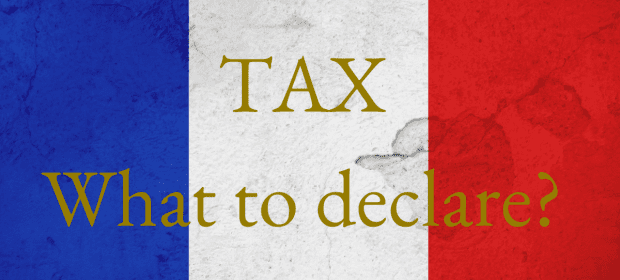
In my last article from early November 2017 I set out the proposed French tax changes for 2018. After some fine-tuning of the proposals the actual changes came into effect from 1 January this year, the most noticeable of which were the introduction of the Flat tax on revenue from capital, and the replacement of the Wealth tax (Impôt de Solidarité sur la Fortune, or ISF) previously levied on total assets, with the new Impôt sur la Fortune Immobilier (IFI). You can read a summary of these and other changes by accessing the following link on our website: French Tax Changes
So, at the time of writing, with “the Beast from the East” sweeping its way across most of Europe last week, you would be forgiven for thinking we are still in the depths of winter rather than into the first month of spring. Spring is my favourite time of year. With any luck things will settle down to normality very soon and we will be enjoying the longer, warmer days with the spring flowers in abundance and the sense of anticipation that summer is just around the corner.
BUT… (of course, there has to be a BUT) along with spring come the, oh so loved, blue and pink Tax Return forms that will be arriving in our post boxes very soon. Over the last couple of years my Spectrum colleagues and I have been writing about the existence of the Common Reporting Standards (CRS) that are now well and truly in operation, whereby financial institutions of the EU and many non-EU countries around the world are exchanging financial information in order to combat tax evasion. If you have been receiving letters from your bank or investment providers asking for your country of residence and Tax Identification Number (TIN) – this is why.
Thus, if you are French resident, it is very important that you declare the existence of all bank accounts, assurance vie policies and any other income generating investments held outside of France, even if you do not draw on the income. Failure to do so can result in severe penalties – €1,500 for each undisclosed bank account or policy (which increases to €10,000 if this is held in an uncooperative State that has not concluded an agreement with France to provide administrative assistance to exchange tax information). Furthermore, if the total value of the bank accounts and policies not declared is at least €50,000, then the fine for each is increased to 5% of the value of the account or policy if greater than €1,500 (€10,000 if in an uncooperative State).
You can make the declaration by listing the information on plain paper and attaching it to your Tax Return. Even bank accounts with a nil balance should be reported. In addition, if you have closed any foreign bank accounts during 2017, the accounts should be reported and the date of closure mentioned.
Unless you will be submitting a Tax Return for the first time (in which case you must complete a paper return) you are required to submit on-line in 2018 if your net taxable income (revenu fiscal de référence) in 2016 was greater than €15,000. However, you are granted an exemption from this requirement if you do not have an internet connection at your home. There are plans for paper based declarations to be completely obsolete by next year.
If you need to complete the pink form for anything other than pension, then perhaps you may be paying unnecessary taxes and therefore might benefit from a review of your financial situation. So don’t wait until May to gather all the information together, make a start now and get organised so that any action needed can be identified and taken care of before the “silly summer season” is upon us – it’ll be here before you know it!
Proposed French Tax Changes 2018
By Sue Regan
This article is published on: 25th October 2017

Since my last article the October Tour de Finance event has taken place at the Domaine Gayda in Brugairolles, near Limoux. As always, it was a huge success and very well attended. It was great to see some familiar faces as well as make some new contacts. Over 70 guests in all came along to listen to a number of industry experts speak about highly topical issues such as the proposed changes to the French tax system, pensions, assurance vie, discretionary fund management and, of course, the “B” word!
In this article I will concentrate on our understanding of some of the proposed changes to the French taxation regime, as published in the Projet de Loi de Finances 2018. Of particular interest to many of our clients are the proposed changes to Wealth Tax, the increase in Social Charges and the new 30% Flat Tax on revenue from capital. At the time of writing, these, and other proposed changes have still to be agreed in Parliament and then referred to the Constitutional Council for review before entering into French law. So we won’t know for sure the exact changes that will take place until the end of the year. However, below is a brief summary of the main proposals as we understand it.
WEALTH TAX (Impôt de Solidarité sur la Fortune)
The government proposes to abolish the current wealth tax system and replace this with Impôt sur la Fortune Immobilier (IFI).
IFI would apply only to real estate assets and the principal residence would still be eligible for the 30% abatement against its value. Therefore, taxpayers with net real estate assets of at least €1.3 million would be subject to IFI on taxable assets exceeding €800,000, as follows:
| Fraction of Taxable Assets | Tax Rate |
| Up to €800,000 | 0% |
| €800,000 to €1,300,000 | 0.5% |
| €1,300,001 to €2,570,000 | 0.7% |
| €2,570,001 to €5,000,000 | 1% |
| €5,000,001 to €10,000,000 | 1.25% |
| Greater than €10,000,000 | 1.5% |
This is good news for French residents with substantial financial assets, including those held within assurance vie. However, there have already been some protests to the scope of the new form of ‘Wealth Tax’ being levied only on real estate, with luxury items such as yachts and gold bullion being exempt. Thus, I don’t think we have heard the last of this!
SOCIAL CHARGES (Prélèvements Sociaux)
It is proposed to increase the Contribution Sociale Généralisée (CSG) by 1.7%. This will result in investment income and property rental income being liable to total social charges of 17.2% and, where France is responsible for the cost of the taxpayer’s healthcare in France, at a rate of 9.1% on pension income.
FLAT TAX on revenue from capital
It is planned to introduce a Prélèvement Forfaitaire Unique (PFU) at a single ‘flat tax’ rate of 30% on investment income, made up as follows:
➢ a fixed rate of income tax of 12.8%; plus
➢ social charges at the rate of 17.2% (taking into account the proposed increase).
The PFU will apply to interest, dividends and capital gains from the sale of shares.
How does this affect Assurance Vie contracts?
Based on information currently available and, of course, the finer details may change before being passed into law, it is our understanding that for premiums invested totalling €150,000 or less per person (so €300,000 for a joint life policy) the existing system of withholding tax (prélèvement forfaitaire libératoire PFL). Taking into account social charges at the increased rate of 17.2%, this results in gains on amounts withdrawn, continuing to be taxed, as follows:
➢ during the first 4 years at 52.2%
➢ between 4 years and 8 years at 32.2%
➢ post 8 years at 24.7%
The first draft of the bill proposed that the new ‘flat tax’ will replace the existing PFL system but will only apply to gains on premiums invested after 27 September 2017, that exceed the thresholds above. However, the National Assembly has already decided that it is illogical to have different tax rates, depending on how long the premium has been invested, for new investments made from 27 September 2017. Therefore, an amendment to the bill has already been proposed that all new investments made should be subject to the ‘flat tax’.
It is proposed that all taxpayers will have the possibility to opt for taxation at the progressive income tax rates of the barème scale, plus social charges. Therefore, any potential gains on capital, including withdrawals from assurance vie policies, should be assessed on an individual basis to determine in advance as to which method of taxation would be most appropriate.
There is no change to the inheritance tax treatment of assurance vie contracts and the post 8-year abatement of €4,600 for a single taxpayer, or €9,200 for a couple, will be maintained. Thus, despite the proposed tax changes, the assurance vie will continue to be a very useful vehicle for sheltering financial assets from unnecessary taxes. In addition, as assurance vie policies fall outside of your estate for inheritance tax purposes, you can leave your investments to your chosen beneficiaries without being subject to the French Succession Laws of “protected heirs”.
The abolition of taper relief
The reform also proposes the abolition of the taper relief on capital gains from the sale of shares, in respect of gains from disposals from 2018.
So, if you are sitting on a portfolio of shares which are not sheltered in a tax wrapper, then now is the time to have a look at any gains you may have and, possibly make use of the taper relief of up to 65% on the total gain, while it is still available. Don’t delay in speaking to your financial adviser who should be able to identify whether the restructuring of your investments is in your best interests.
Planning to retire to France – don’t get caught in the tax trap!
By Sue Regan
This article is published on: 18th September 2017
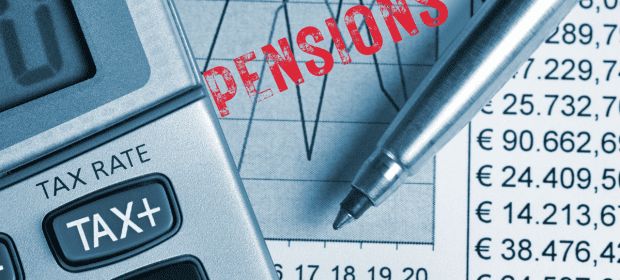
Retiring to France can be dream come true for many people. The thought of that ‘place in the sun’ motivates us to save as much as we can whilst we are working. If we can retire early – so much the better!
In the excitement of finding ‘la belle maison’ in ‘le beau village’, we really don’t want to think about some of the nasty things in life. I am referring to death and taxes. We can’t avoid these and so better to plan for the inevitable. Sadly, some people do not plan before making the move to France and only realise this mistake when it is too late to turn the clock back.
For example, investments that are tax-free in your home country will not usually be tax-free in France. This includes UK cash ISAs and premium bond winnings, as well as certain other National Savings Investments, all of which would be taxable in France. So too would dividends, even if held within a structure that is tax-efficient elsewhere. All of these will be subject to French income tax at your marginal rate (ranging from 0% to 45%) plus social contributions, currently 15.5%.
Gains arising from the sale of shares and investment funds will be liable to capital gains tax. The taxable gain, after any applicable taper relief, will be added to other taxable income and taxed at your marginal rate. Social contributions are charged on the full gain.
If you receive any cash sum from your retirement funds, for example, the Pension Commencement Lump Sum from UK pension funds, this would be taxed in France. The amount will be added to your other taxable income or under certain conditions, it can be taxed at a fixed rate of 7.5%. Furthermore, if France is responsible for the cost of your healthcare, you will also pay social contributions, currently around 7.4%.
Distributions received from a trust would also be taxed in France and there is no distinction made between capital and income – even if you are the settlor of the trust.
As a resident in another country, it would be natural for you to take advantage of any tax-efficiency being offered in that jurisdiction, as far as you can reasonably afford. So it is logical that you would do the same in France.
Happily, France has its own range of tax-efficient savings and investments. However, some planning and realisation of existing investments is likely to be needed before you become French resident, if you wish to avoid paying unnecessary taxes after becoming French resident.
I mentioned death above and as part of the tax-efficient planning for retirement, inheritance planning should not be overlooked. France believes that assets should pass down the bloodline and children are ‘protected heirs’, so they are treated more favourably than surviving spouses. Therefore, action is needed to protect the survivor, but this could come at a cost to the children – particularly step-children – in terms of the potential inheritance tax bill for them.
Whilst there might be a certain amount of ‘freedom of choice’ for some expatriate French residents, as a result of the introduction of the EU Succession Rules, this only concerns the possibility of being able to decide who you wish to leave your estate to and so will not get around the potential French inheritance tax bill, which for step-children would still be 60%. Therefore, inheritance planning is still needed and a good notaire can advise you on the options open to you relating to property.
For financial assets, fortunately there are easier solutions already existing and investing in assurance vie is the most popular choice for this purpose. Conveniently, this is also the solution for providing personal tax-efficiency for you. There is a range of French products available, as well as international versions. In the main, the international products are generally more suited to expatriates as a much wider choice of investment options is available (compared to the French equivalent), as well as a range of currency options (including Sterling, Euros and USDs).
If possible, you should seek independent financial planning advice before making the move to France. A good adviser will be able to carry out a full financial review and identify any potential issues. This will give you the opportunity to take whatever action is necessary to avoid having to pay large amounts of tax to the French government, after becoming resident.
Even if you have already made the move to France, it may still worth seeking advice, particularly if you are suffering the effects of high taxation on your investment income and gains or you are concerned about the potential inheritance taxes for your family. A full review of your personal and financial situation enables us to identify any issues and recommend solutions that will meet your long-term goals and objectives.
The above outline is provided for information purposes only and does not constitute advice or a recommendation from The Spectrum IFA Group to take any particular action on the subject of investment of financial assets or on the mitigation of taxes.
Update – Le Tour de Finance, Domaine Gayda, 6th October 2017
This year’s event is now fully subscribed but we are keeping a reserve list in case of any cancellations, so please let me know if you would like to be added to the list. Alternatively, if you would like to have a confidential discussion about your financial situation, please contact me either by e-mail at sue.regan@spectrum-ifa.com or by telephone on 04 67 24 90 95.
The Spectrum IFA Group advisers do not charge any fees directly to clients for their time or for advice given, as can be seen from our Client Charter

